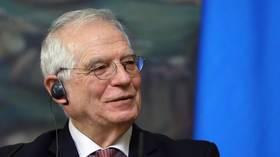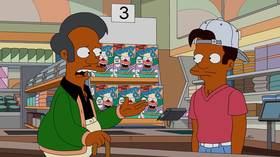‘Dangerous neighbor’ Russia is becoming ‘more and more authoritarian’ & NATO should ‘push back', says EU Foreign Minister Borrell
Russia is a "dangerous neighbor," but Brussels must maintain channels of communication with Moscow to solve issues of mutual interest. That's according to the European Union's top diplomat, speaking at a NATO meeting on Wednesday.
Josep Borrell, the EU's High Representative, was speaking before the second day of meetings with NATO foreign ministers, focused on the relationship between Russia and the US-led bloc.
"Russia is a neighbor, a dangerous neighbor, but we have to share with them some issues in which we have common interests, like the nuclear agreement with Iran or climate change," Borrell said. "But, above all that, we have to contain Russia, to push back Russia when it infringes international law."
Also on rt.com Moscow now has ‘no relations’ with EU because Brussels has ‘destroyed’ once friendly ties, Russian Foreign Minister Lavrov claimsAccording to Borrell, Moscow is drifting away from so-called European values and is becoming "more and more an authoritarian country." In particular, the eurocrat noted cyber-attacks, disinformation, and the alleged poisoning of opposition figure Alexey Navalny as examples.
Borrell, however, didn’t mention the growing authoritarian trend within the NATO bloc itself. The US government-funded NGO Freedom House has admitted that five of its 30 members are not considered to be democracies – Albania, Hungary, Montenegro, North Macedonia and Turkey.
A common trope from Russia bashers in US/UK media & the think tank racket is that Moscow never wanted to integrate into US-led & designed "Atlantic" security system. Yeltsin wanted to join NATO in the 1990s (before other East European states). So did Putin in the 2000s. https://t.co/mlwOrjTFnA
— Bryan MacDonald (@27khv) May 24, 2020
"We have taken sanctions against high-level Russian officials for these issues, and we have to continue working on the framework of the five guiding principles to define the unity of the Europeans and our NATO partners," Borrell continued.
The diplomat's comments come a day after Russian Foreign Minister Sergey Lavrov said that Moscow has "no relations" with the EU because Brussels has "destroyed" once-friendly ties through its "unilateral decisions."
In February, following a visit to the Russian capital, Borrell was slammed by Western politicians for being too friendly to Moscow, after a cordial meeting with Lavrov.
Some European officials called the trip "humiliating," criticizing Borrell for standing silently by while Lavrov called the EU an "unreliable partner."
After arriving back in Brussels, he quickly changed his tune, accusing Moscow of not wanting to "have a more constructive dialogue." That came off the back of numerous high-profile figures calling for his resignation. Borrell has been noticeably more hardline on Russia since, perhaps fearing for his job.
The two-day NATO meeting, which started on Tuesday, is being held at the alliance's headquarters in Brussels. Before it began, Secretary-General Jens Stoltenberg accused Russia of suppressing "peaceful dissidents at home," as well as displaying "a pattern of aggressive behavior abroad."
"As an Alliance, we remain committed to our dual-track approach to Russia: strong deterrence and defense, combined with openness to meaningful dialogue, including on issues such as arms control," he said.
Think your friends would be interested? Share this story!















